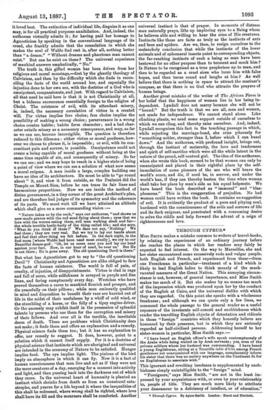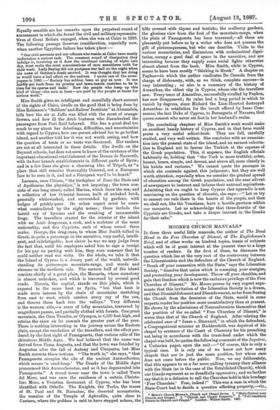THROUGH CYPRUS.*
Mass SMITH makes a mistake common to writers of travel-books, by relating the experiences of an ordinary journey before she reaches the places in which her readers may fairly be expected to feel interest. On the way to Marseilles, she and her sister encountered some excessively rude and vulgar people, both English and French, and experienced from these—from one Frenchman in particular—treatment of a kind which is likely to lead English ladies to think meanly of the much- vaunted manners of the Great Nation. This annoying circum- stance is not, however, of general importance, and Miss Smith makes too much of it. But she makes by no means too much of the impression which was produced upon her by the conduct of the English at Cairo, and the universal dislike with which they are regarded. On this point she speaks with a wholesome frankness ; and although we can quote only a few lines, we commend the whole passage to the general reader as a useful exposure of the inveterate self-conceit and snobbishness which render the travelling English objects of detestation and ridicule in those "foreign" countries which they honestly believe are honoured by their presence, bat in which they are seriously regarded as half-civilised persons. Addressing herself to her sister-women in particular, Miss Smith says :— " I have beard an English officer's wife speak contemptuously of the Arabs while being waited on by Arab servants ; yes, even of the private soldiers whom her husband was commanding. I have heard a young Englishman, sitting at a Trouville table d'hOle among French gentlemen not unacquainted with our language, complacently inform his sister that there was no society anywhere on the Continent fit for an Englishman to associate with."
This ignorant and revolting insolence is supplemented by snob- bishness simply unintelligible to the " foreign " mind.
"Foreigners," says Miss Smith, "are not in the least im- pressed by your acquaintance with, or even by your relationship to, people of title. They are much more likely to attribute your demeanour to a deficiency of intellect, or of education."
Through Cyprus. By Agnes Smith. Leaden: Emit and Blaokett.
Equally sensible are her remarks upon the perpetual round of amusement in which she found the civil and mffitary representa-
fives of Great Britain engaged, when she was at Cairo in 1286. The following passage deserves consideration, especially now, when another Egyptian failure has taken place
"Our civil servants and our officers who reside at Cairo have Barely undertaken a serious task. The constant round of dissipation they indulge in, involving as it does the continual turning of night into day, must make the most conscientious of men sometimes unfit for their work. Lady Baring did not postpone her ball on the night when the news of Gordon's death arrived. It was thought that her doing so would have a bad effect on the natives. I quote one of the news- papers in MS Society has seldom been so gay as now. It clan hardiy-get back from its picnics and lawn-tennis matches to be in time for its operas and halls.' Now the people who keep up this kind of thing—the men at least—are paid by the people at home for serious work."
Miss Smith gives an intelligent and mercifully short account of the sights of Cairo, dwells on the good that is being done by Miss Robinson's "Soldiers' and Sailors' Institute" at Alexandria, tells how the air at Jaffa was filled with the scent of orange. flowers, and how ill the Arab boatmen who disembarked the passengers from Port Said behaved. She has a great deal too much to say about her debatings, difficulties, and uncertainties with regard to Cyprus, how one person advised her to go to that island, and another told her it was not worth seeing, and how the question of tents or no tents was discussed. Her readers are not at all interested in those details. She dwells on the Beyrout schools, but does not seem to know of the existence of the important educational establishment of the Dames de Nazareth, with its four branch establishments in different parts of Syria; and in a few lines she gives a charming idea of Tripoli, as "a place that still remains thoroughly Oriental, not a European face to be seen in it, and not a European word to be heard."
Larnaca, once Citium, "the birthplace of Zeno the Stoic and of Apollonian the physician," is not imposing ; the town con- sists of one long street, called Marina, which faces the sea, and a collection of low Oriental houses, built of unbaked brick, generally whitewashed, and surrounded by gardens, with hedges of prickly-pear. Its urban aspect must be some- what contradicted by the night noises, these include the horrid cry of hyrenas and the croaking of innumerable frogs. The travellers started for the interior of the island with an Arab dragoman, a cook, and a muleteer of the same nationality, and five Cypriots, each of whom owned three mules. George, the dragoman, to whom Miss Smith talked in Greek, is quite a personage in the narrative, very usefu], intelli- gent, and indefatigable; how clever he was we may judge from the fact that, until his employers asked him to sign a receipt for his pay on parting with him, they were unaware that he could neither read nor write. On the whole, we take it that the Island of Cyprus is a dreary part of the world, notwith- standing its picturesque mountain-range, and woods and streams on the northern side. The eastern half of the island consists chiefly of a great plain, the Messaria, whose monotony is almost unbroken, and which is traversed by several good roads. Nicosia, the capital, stands on this plain, which is exposed to the same heat as Syria, "but that heat is made more intense by the chain of mountains stretching from east to west, which catches every ray of the sun, and throws them back into the valleys." Very different is the western side,—a mass of lofty mountains, traversed by magnificent passes, and partially clothed with forests. One great mountain, the Oros Troados, or Olympos, is 6,590 feet high, and retains the snow on its Summit the greater part of the year. There is nothing interesting in the journey across the Eastern. plain, except the resolution of the travellers, and the effect pro- duced by the first sight of Famagousta, that curious relic of the chivalrous Middle Ages. We had believed that the name was derived from Fame Augusta, and that the town was founded by Augustus after the fall of Antony and Cleopatra, but Miss Smith corrects these notions. "The truth is," she says, "that Famagonsta occupies the site of the ancient Ammochostos, which means a sand-heap.' The Greeks of the Middle Ages pronounced this Ammochoustos, and so it has degenerated into Famagousta." A round tower near the town is called Torre del Moro, and was once the residence of a certain Chriato- fore Moro, a Venetian lieutenant of Cyprus, who has been identified with Othello. The Knights, the Turks, the traces of St. Paul and St. Barnabas, the deserted monasteries, the remains of the Temple of Aphrodite, quite close to Cantata, where the goddess is said to have stepped ashore, the
hills covered with thyme and lentisks, the mulberry gardens, the glorious view from the foot of the mountain-range, when the plain of Famagoasta has been traversed,—all these are pleasantly put before us by a writer who does not possess the gift of picturesqueness, but who can describe. Visits to the various monasteries, and discussions with ecclesiastical digni- taries, occupy a good deal of space in the narrative, and are interesting because they supply some social lights otherwise almost absent from the book. Miss Smith, while in Cyprus, seems to have been mostly "thinking in Greek." A chapter on Paphos—in which the author vindicates Be Cesnola from the charge of dishonesty, with, as we think, complete success—is vary interesting ; so also is a summary of the history of Amanthus, the oldest city in Cyprus, whose site the travellers saw. Every trace of Amanthus, successfully rivalled by Paphos, has now disappeared; its rains had a long period in which to vanish by degrees, since Richard the Lion-Hearted destroyed Amanthus in retaliation for the insult offered by Isaac Corn- menus, the last Duke of Cyprus, to Berengaria of Navarre, that queen-consort who never set foot in her husband's realm.
The concluding chapters of Miss Smith's work would make an excellent handy history of Cyprus, and in that form would prove a very useful school-book. They are full, carefully studied, and very well written. She concludes with an crap:dna- tion into the present state of the island, and an earnest exhorta- tion to England not to favour the Turkish at the expense of the Greek population. This, it appears, the English officials habitually do, holding that "the Turk is more truthful, sober, honest, brave, simple, and devout, and above all, more cleanly in his habits and customs." We cannot quote the passages in which she contends against this judgment; but they are well worth attention, especially when we consider the gradual spread of education among the Greek population, and the near advent of newspapers to instruct and inflame their national aspirations. Admitting that we ought to keep Cyprus (her appendix is not convincing on the question of climate), she says —" Let us try to cement our rule there in the hearts of the people, and then we shall not, like the Venetians, have a hostile garrison within our ramparts. Let us acknowledge that three-fourths of the Cypriots are Greeks, and take a deeper interest in the Greeks for their sake."



































 Previous page
Previous page